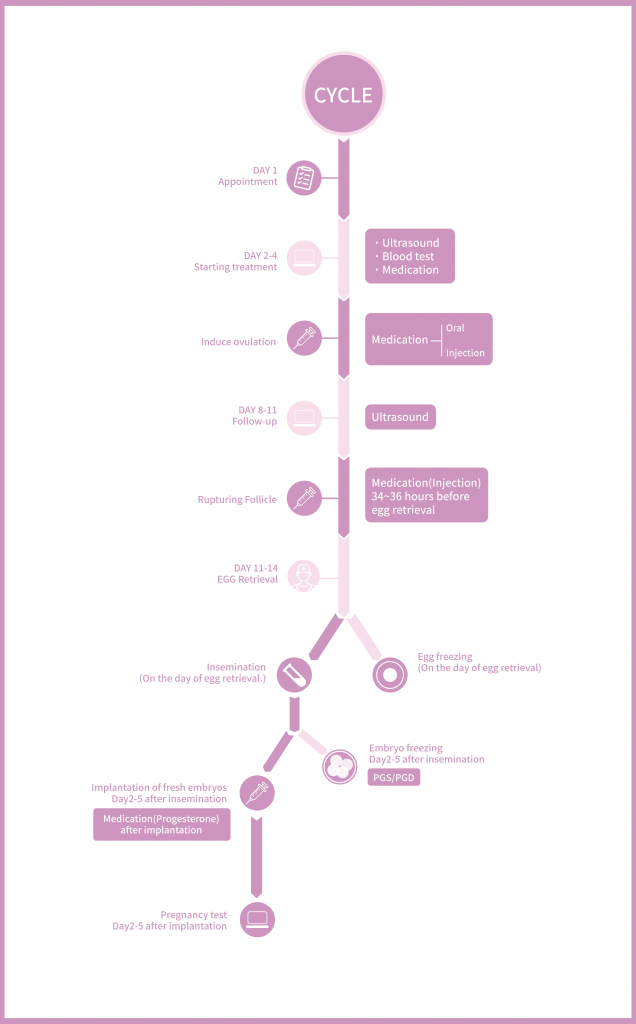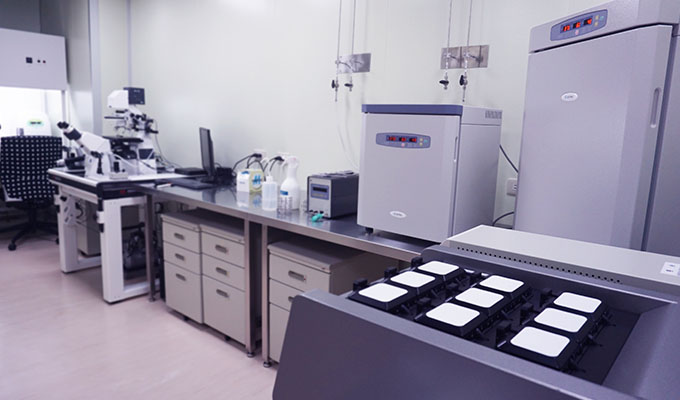In vitro fertilization
IVF
- ourservices
In vitro fertilization (IVF)
Who is suitable for the IVF treatment?
- Those with fallopian tube obstruction
- Those with severe endometriosis
- Those with severe male infertility
- Those with several failed IUI treatments
- Those with sexual dysfunction
- Advanced maternal age or early aging of the ovary
- In Vitro Fertilization (IVF) refers to the retrieval of mature eggs from the ovaries under the guidance of ultrasound, followed by fertilization with pre-treated spermatozoa in petri dishes until the formation of embryos. These are to be cultured in vitro for several days, and then depending on personal circumstances, the embryos can be transferred into the uterus or cryo-preserved until the appropriate time for embryo thawing and implantation in the uterus.
- Note: A valid marriage certificate is necessary.

- Procedure: Blood tests are done on day 2 of the menstrual cycle to aid in the choice of the most suitable medications to stimulate ovulation. While on medication, around day8-11 ultrasound and blood tests are used to track follicular maturation. When follicles are mature, the patient is given human chorionic gonadotropin (HCG) to trigger the final maturation of eggs. 34-36 hours later, egg retrieval (around day 11-14 )is done under the guidance of vaginal ultrasound(TVOR).
- There may be some pain or vaginal bleeding after the procedure. Analgesic and antibiotics will be given for relief. Patients are advised to keep in touch with us for any associated problems.
- Semen collection: It is necessary to abstain from any sexual intercourse for 2-4 days. It can also be collected on the day of egg retrieval. For your convenience, you can also collect the semen at home in advance, but would need to keep the specimen at room temperature and deliver it to our lab within 2 hours.
- Egg retrieval: The operation time is short, has no wounds, and is considered an outpatient surgery.
- Intra-Cytoplasmic Sperm Injection(ICSI)
- Under the microscope, normal appearing spermatozoon with good activity is selected and directly injected this into the cytoplasm of the egg with a microinjection needle to complete the process of fertilization. At present, the fertilization rate by ICSI in our center is highly successful and considered as one of the more effective methods to treat male infertility..
Laser assisted Hatching
FM IVF center uses this technology to make a small hole or slit in the zona pellucida to make it easier for the embryo to hatch, thus increasing the implantation rate. Precise lasers do not harm the embryos and this technique can increase the pregnancy rate for those who have many failed IVF attempts, or for those more advanced in childbearing age.
Time-lapse Incubator
We adopt the most advanced time-lapse photographic monitoring incubator to take a picture of the embryo every 10 minutes, and to incubate the embryo until the fifth day without opening the incubator. This advanced technique can observe the dynamic changes of the embryo under constant conditions that do not interfere with embryonic development. Combining artificial intelligence (AI) with big data analytics, we can further screen out the best quality embryos for implantation, thus drastically increasing the pregnancy rate and live birth rate.
